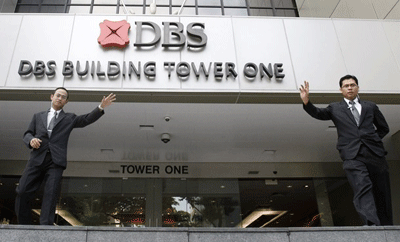Junta Gas Profits Stashed in Singapore Banks: ERI
At a Bangkok press conference on Thursday, Earthrights International (ERI) launched two reports alleging that oil giants Total and Chevron are linked to “forced labor, killings, high-level corruption and authoritarianism” in Burma.
The reports, titled “Total Impact” and “Getting it Wrong,” examine how revenue from the Yadana gas project sustains military rule in Burma and undermines Western sanctions.
The NGO also said that two Singapore-based banks—Overseas Chinese Banking Corporation (OCBC) and DBS Group—function as “offshore repositories” for junta revenues accruing from the Yadana gas project.
 |
| Security guards gesture to photographers to stop taking photos of the DBS Group bank in Singapore in April. The bank is accused of laundering the Burmese junta’s siphoned gas profits. (Photo: Reuters) |
The report said that Burma’s ruling State Peace and Development Council has earned almost US $5 billion from the gas pipeline project.
By using an outdated exchange rate, the junta declares a fraction of the revenues to the State budget, enabling it to siphon the rest off. The junta calculates revenue at just 6 kyat to the dollar when the de facto rate is closer to 1,000.
According to a confidential International Monetary Fund (IMF) report obtained by ERI, revenue "contributed less than 1 percent of total budget revenue in 2007/08, but would have contributed about 57 percent if valued at the market exchange rate."
The report says these rates allow the regime to list a mere $29 million of the Yadana earnings, leaving around $4.8 billion unaccounted for, which ERI believes to be lodged in the Singapore banks.
ERI’s Matthew Smith said that the information about offshore accounts in Singapore comes “from confidential and reliable sources,” but could not go into more detail.
“We expect the Singapore government and banks to do the right thing based on Singaporean law relating to money laundering, which prohibits any such transactions and requires banks to report these,” he added.
According to Smith, the two banks were informed in writing during the past week about the content of the reports, but ERI has yet to receive a response.
ERI is an environmental NGO based in the US, but was founded by Ka Hsaw Wa, an ethnic Karen and former Burmese student activist in exile since his involvement in the 1988 demonstrations against military rule.
ERI says that Total, Chevron and the Petroleum Authority of Thailand Export and Production (PTTEP)—the other non-Burmese company involved in Yadana—have earned a combined $1.3 billion since commercial production started in 2000.
The gas is piped into Thailand where it generates electricity for the Bangkok area, and in total makes up 60 percent of Burma's gas exports to Thailand. Total has been a major investor in the Yadana project since 1992, holding a 31.24 percent stake, with Chevron on 28 percent.
In a recent Newsweek interview, Total CEO Christophe de Margerie said that critics of the company's operations in Burma can “go to hell,” adding that the gas imports into Thailand have helped reduce air pollution in Bangkok.
In a June 26 letter to ERI published in the “Total Impact” report, Vice-President Jean-Francois Lasalle refused to answer a number of questions sent to Total by ERI. According to the letter, this was because ERI “presents allegations as facts,” and is “more interested in harassing our companies, in line with a divestment agenda, than in a real dialogue about how to improve people's lives.”
Total has cited its socioeconomic work in the pipeline area, and the “overall improvement in living conditions for the 50,000 people” who live in the pipeline area. Total refers ERI to a report by US-based CDA Collaborative Learning Projects, which gave the findings of a 20-day impact assessment of the oil company's operations related to the Yadana project.
However, the positive CDA report was dismissed as a whitewash by ERI, with report author Naing Htoo saying CDA’s methodology was deeply flawed, given that CDA lacked autonomy after being hired by Total to do the impact assessment.
ERI accuses Total and Chevron of complicity in human rights abuses throughout the history of the project.
1 | 2 next page »
- 'My Wife Died From Police Abuse,' Says Husband
- US Says Observer Conditions Don't Meet Int'l Standards
- 159 Observers to Monitor Burma Election
- Govt to Address Breaches of SSA-South Ceasefire: Aung Min
- Burma Investors Pin Hopes on Seminal Sunday
- Malaysia PM Leads 50-Strong Delegation to Burma
- US Congress to Assess Burma's Political Prisoner Issue
- Rangoon Woman in Police Station Death Plunge
- Burmese Legal System Remains Tool of Govt: AHRC
- Burmese Army Chief Defends Political Role
